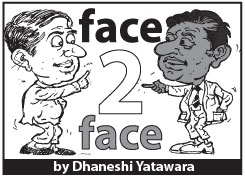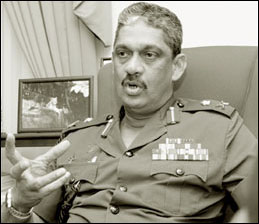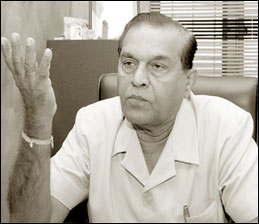Successes, failures and potential - 60 years after independence

As Sri Lankans we have faced and heard of many victories and debacles
in the past. And we continue to hear of the victories of our brave
soldiers. How are we performing and where are we heading? These are the
views of the present Army Commander and a prominent former Army
Commander given to 'Face 2 Face'.
Sixty years after independency how do you see the development of
the Armed Forces, particularly the Army?

Present Army Commander
Lt. Gen. Sarath Fonseka |

Former Army Commander
Gen.Hamilton Wanasinghe (Rtd.) |
Present Army Commander Lt. Gen. Sarath Fonseka: The Army is 59 years.
Till mid '80s the Army never expanded. A fair amount of expansion took
place in General Wanasinghe's time. Problem was that we expanded the
Army in relation to the expansion of the LTTE. We were trying just to
constrain the LTTE and only were able to manage the LTTE threat. Because
of these reasons we had to totally abandon certain areas. The difference
is that now we are in full strength in the Eastern Province. And in
Jaffna we have 37,000 Army personnel. At the time I took over, two years
ago, there were only 29,000. The whole Army is now ten times stronger.
Because of our strength, it is we who decide where to go and fight. The
LTTE reacts. In the past we only reacted and the LTTE decided. We can
move forward not even thinking of what the LTTE can do.
Former Army Commander Gen. Hamilton Wanasinghe (Rtd.): I see a
tremendous development. We can see a vast expansion at present. I
witnessed the Army as a young cadet in 1948 at the Independence Day
parade. It was more of a ceremonial army. Things have changed now. And
we started to see significant changes mainly in the 1980s. In early '50s
the Army was quite small with few regiments. The Ceylon Light Infantry,
the Artillery regiment that had anti-aircraft weapons and two companies
of Engineers along with few other small elements. The Artillery regiment
was the largest at that time. Today the youngsters in the Army know what
they are doing. They are engaged in an Army totally different to the one
I joined. They are more actively involved in defending the nation. I
have my own losses in the Army which I would not forget. I know what the
nearest and the dearest of a soldier are going through because they are
actively involved in defending their motherland.
Aren't we still struggling to free ourselves from an internal
terrorism, even with an Army of such strength?
Lt. Gen. Sarath Fonseka: The issue is that the LTTE can use
their cadres any where as they do not have a commitment to protect Tamil
people. So their cadres can be shifted from place to place. Even with a
massive number, the Army had to deploy 95% of the soldiers for our duty
to defend our people as well as to protect areas we liberate. So for the
offensives we had only a limited number. To eliminate terrorism we have
to go on offensives. If the Army is not commanded properly or deployed
effectively you cannot win a war. This needs practical thinking. Anybody
who is just following the book or heading for strategies not
understanding the tactics of the enemy cannot win a war. I think we are
doing quite well at the moment, without those failures.
Gen. Hamilton Wanasinghe (Rtd.): Well, the US Army could not
get hold of the leader of Al Qaeda, Bin Laden, even with their super
powers. Terrorism is not easy to defeat. And this is not something that
emerged due to a military situation. There were political setbacks when
the military wanted to take steps to eliminate terrorism. And the Sri
Lankan Army did not have this mush of strength those days though we had
several achievements. It is no easy task to wipe out terrorism. The Army
had limited resources, limited training facilities and less experience.
Now everything has advanced and the capability of the Army to wash away
terrorism is more.
How do you see the situation of the Army since the day you entered
as a cadet until you becoming the Commander of the Army?
Lt. Gen. Sarath Fonseka: When I joined the Army 37 years ago
there was only one Major General commanding the Army, a Brigadier and
five Colonels. Growing up on from an eighteen year old to a fifty five
year old, one learns more and gets more educated. You gain lot of
additional experiences and eventually you are given more
responsibilities. I feel that is the actual difference. Some may think
the difference is in the badges we wear on our shoulders. But in my
point of view that should not be the actual change. It is made through
education, qualifications and experience and the service towards the
country.
Gen. Hamilton Wanasinghe (Rtd.): We have advanced by leaps and
bounds. Those days the Army had limited training facilities. Now we are
equipped with an academy of our own. Our men know what they are doing.
They have become experts in the field even an average soldier. The Army
is well looked after as I can see. Even a need of a lowest ranker is
considered and met on time. It boosts up the morale of the men. There
are more responsibilities on the Army at present than in those days I
entered. And the personnel are capable of handling it with their
training, experience and facilities. When there are logistic problems
frustration can build up among the soldiers. But what I feel is that it
is not happening now.
What is your assessment of the enemy?
Lt. Gen. Sarath Fonseka: I never had any respect for the LTTE.
Commitment alone cannot lead to victory. The cadres should be well
trained. The LTTE is not extraordinarily strong. We have proven it. In a
short period of time we defeated the LTTE in the East. We eliminated
almost all of them except for few hundreds who ran away for their lives
and ended up in the North. And in the North the LTTE lost a large
number, about 5000, in the past one and a half years. Now they are left
with only 40% of their strength and capabilities. They have lost 100% of
their political status. Lost 100% of their popular base and support.
Even the majority of the Tamil Diaspora are not supporting them, it is
becoming evident. If we have the right people at the right place the
LTTE would never engage in confrontations. In instances where we took
the right decision the LTTE was defeated. All round the LTTE have come
to a weak stage. They themselves must be wondering what their final
destiny is going to be.
Gen. Hamilton Wanasinghe (Rtd.): Difficult to say. Yet with
what I gather, I feel they are weakened. At the time I was in the
service the LTTE was much stronger, and in addition the Army did not
have enough resources.
It seems that the strength of the LTTE is unpredictable. They were
weakened several times in the past yet they emerged in a big way. How do
you see this?
Lt. Gen. Sarath Fonseka: Every time when they were weak they
came in for peace talks. They use that time to recover. They lick their
wounds and recover. So, after every ceasefire period they came back with
much larger strength and capabilities. The LTTE recorded several
victories sometimes because of our faults and sometimes because of the
administrators who took decisions to Ceasefire at the wrong time.
Gen. Hamilton Wanasinghe (Rtd.): Well, every time they were
getting badly beaten, they came for peace negotiations. And during the
time of negotiations they would recover their losses, go for new
recruitment and they have a compulsory recruitment system in their
areas. Every time they were weakened militarily they came for peace
talks.
The LTTE is engaged in fighting in a different strategy - Fighting In
Built Up Areas (FIBUA). In addition the Sri Lanka Armed Forces have to
engage in conventional fighting and overcome guerilla tactics. Isn't
this a challenge?
Lt. Gen. Sarath Fonseka: We are ready to face any challenge.
The LTTE must be wondering what strategy they should take next because
we see no other strategy except for what they have used so far. We feel
that at the moment the LTTE has gone out of balance. FIBUA, we have used
only in very few occasions. The LTTE were engaged in basically hit and
run tactics. Guerilla tactics succeeded against the conventional methods
the Army used, because, such could be used in different locations at the
same time. The Army, at times, was confined to some areas while carrying
on conventional tactics. Now we are using a mixture of all these
strategies. We are ready to adopt a relevant strategy according to the
requirement. When we need to go for conventional methods, of course we
are ready. We have the man power and the equipment required for
conventional methods. We have the capability to go for guerilla tactics
when necessary. Basically we are not using conventional tactics at the
moment though we have such weapon systems.
Gen. Hamilton Wanasinghe (Rtd.): I do not call it FIBUA. We do
not have such situations. The LTTE want to bring back the 1983
situation. They are trying their best to create such a situation. Any
parent will not tolerate the killing of innocent children. World opinion
on LTTE should change. Who ever does it, killing innocent civilians to
achieve their narrow minded targets is unacceptable. Even in the
history, at the time I was in service, the Army tried their best to
avoid innocent civilians being targeted. We emphasised these to
politicians when required. The target should be flushing out terrorism.
The Sri Lankan Army succeeded in liberating the total Eastern
Theatre and stabilising security in many parts of the country. Yet, the
LTTE presence was felt in Down South very recently. How do you see this?
Lt. Gen. Sarath Fonseka: Attacking civilians is something any
one can do easily. Even an underworld thug can do that. For the LTTE to
do what they are doing in Yala in Down South, they only need about
thirty cadres. But they cannot achieve any military targets or
assassinations of VIPs. It is easy to target civilians because it is not
possible to provide security to each and every individual in this world.
When the East was liberated many Tigers, including leaders, fled to the
North and some escaped to the South. These who fled to the South were
hiding in the Kanjikudichchiaru jungles and there is a vast jungle area
spreading towards the southern parts bordering by several Sinhala
villages of the up country and the eastern side by several Tamil and
Muslim villages. These Tiger cadres get friendly with some villagers
doing 'Ganja' growing in the jungles. LTTE get the information about
movements of troops.The LTTE is desperate and that is evident through
such actions. They are targeting civilians because they cannot do better
than that. If they can be more civilised they will target more strategic
points. They are unable to do that. We have deployed about 1000 Army
personnel in that area. Yet we are capable of running the operations in
the Wanni without any hindrance.
Gen. Hamilton Wanasinghe (Rtd.): Eradicating terrorism is the
responsibility of the whole nation. And it is not only the Army.
People's support in controlling terror situations in the past has
assisted the Armed forces enormously. The same should be happening now.
The Army is strong enough to act against terrorism. Yet they need the
support of the public as well. It is everyone's duty. What happened in
Dambulla on 2nd February? The bus bomb blast could have been averted if
people were more vigilant. The LTTE is a terrorist organisation. They
are ruthless in their actions and their attacks can occur anywhere.
Your predecessors insisted on a political solution to the crisis.
The international Community also insists the Government on this aspect.
How do you see this?
Lt. Gen. Sarath Fonseka: The political Solution is for the
innocent Tamil people. The military solutions is for the terrorists. We
are not hunting the Tamil people but we are hunting terrorists. As long
as terrorism is present in an area it will not be possible to bring
about a political solution. The LTTE have a different strategy. If you
want to listen to the grievances of the people, if the democratic
systems are to be established, we have to get rid of the terrorists.
They should realise by now that they will never achieve what they intend
to gain through terrorism.
Gen. Hamilton Wanasinghe (Rtd.): We should go for a political
solution. Power should be devolved to the Tamil populace not to the LTTE.
They will not change their cause. They are aiming for a separate state.
If we satisfy the needs of the minorities of this country and look in to
their grievances, definitely they will not support the LTTE or any other
terrorist organisation. We should only go for terrorists and not for
innocent civilians. This is what I emphasised to my troops before we
headed for our operations. We must take the innocent people out of the
clutches of the LTTE.
How do you see the operations being carried out in Wanni? Are you
hopeful of a solid victory, similar to what we saw in the Eastern
sector?
Lt. Gen. Sarath Fonseka: At the time we were fighting in the
East we were carrying on in the North and particularly the Wanni area.
That was in August last year. Nobody knew that there was an infantry
division engaged in combating terrorists in Wanni from March last year.
The LTTE had their bases, leaders and much more strength in the East yet
we defeated them. They were stronger than now. They had more ammunition
and man power. Even with those advantages they lost. If they could not
face us when they had 100% strength can they win when they have only
half the strength they had? The LTTE is running short of time and
running short of opportunities.
Gen. Hamilton Wanasinghe (Rtd.): I am confident that there
will be victory. But when and how, it is up to the people who steer the
operation to decide. The Army seems to be achieving the given targets
very well. We should go for the terrorists.
Pix by Kavindra Perera
|
